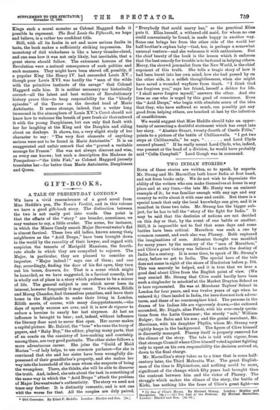GIFT-BOOKS.
A TALE OF PRESENT-DAY LONDON.*
WE have a vivid remembrance of a good novel from Miss Heddle's pen, The Town's Verdict, and in this volume we have a good gift-book story. The distinction between the two is not easily put into words. One point is that the effects of the " story " are broader, sometimes, we may venture to say, a little cruder. The scene, for instance, in which the Misses Candy search Major Derwentwater's flat is almost farcical. These two old ladies, known among their neighbours as the "Acid Drops," have been brought down in the world by the rascality of their lawyer, and regard with suspicion the tenants of Marigold Mansions, the fourth- rate abode in which they are compelled to sojourn. The Major, in particular, they are pleased to consider an impostor. "Major indeed !" says one of them; and one day, accordingly, finding the door of his flat open, they turn out his boxes, drawers, &c. That is a scene which might be hazarded, as we have suggested, in a farcical comedy, but is wholly out of place in a story which professes to be a mirror of life. The general subject is one which never loses its interest, however frequently it may recur. Two sisters, Eilidh and Morag Chandos, find themselves penniless, and leave their home in the Highlands to make their living in London. Eilidh meets, of course, with many disappointments,—the days of speedy success are over, and it is now de rigueur to reduce a heroine to nearly her last sixpence. At last an influence is brought to bear ; and, indeed, without influence the literary door next to never flies open. Her career makes a capital picture. Mr. Dalziel, the " boss" who runs the troop of papers, and "Baby Boy," the editor, playing many parts, that of an oracle on the casuistry of love-making and courtship among them, are very good portraits. The other sister follows a more adventurous career. She joins the " Guild of Maid Marian "—of lady helps, to use common parlance—for she is convinced that she and her sister have been wrongfully dis- possessed of their grandfather's property, and she makes her way into the household of the man whom she suspects of being the wrongdoer. There, she thinks, she will be able to discover the truth. And, indeed, she sets about the task in something of the same way in which the " Acid Drops " attack the problem of Major Derwentwater's authenticity. The story we need not tram any further. It is distinctly romantic, and is not one whit the worse for that. All the couples are duly paired.
• Girl Comrades. By Ethel F. Meddle. London : Mackie and Son. [Os.]
" Everybody that could marry has," as the practical Eliza puts it. Eliza herself, a withered old maid, for whom no one could conveniently be found, is made happy in another way. Some one brings her from the other side of the world her half-brother's orphan baby—that, too, is perhaps a somewhat unusual venture—and she welcomes it with enthusiasm. But the chief beauty of the book is the lesson which it enforces that the best remedy for trouble is to be found in helping others. Mercy, the shrewd journalist from the New World, is the chief exponent of this truth. She tells a tragic story of how it had been burnt into her own mind, how she had passed by on the other side, in a selfish thoughtlessness, when she might have saved a wounded wayfarer from death. " I think God has forgiven you," says her friend, herself a debtor for life. " I shall never forgive myself," answers the other. And she lives as one who is urged by this goad of conscience. Even the "Acid Drops," who begin with absolute scorn of the idea that they, who have suffered so much, can possibly get any good from helping others, are touched at last by the infection of unselfishness.
We would suggest that Miss Heddle should take an oppor- tunity of correcting a doubtful statement which has crept into her story. " Alastair Stuart, twenty-fourth of Castle Fillin," points to a picture of the battle of Chillianwalla. "I got two
steps at Chillianwalla," he says, " and Lord Clyde seemed pleased." If he really meant Lord Clyde, who, indeed, was present at the bead of a division, he would have probably said "Colin Campbell." Lord Gough was in command.


























































 Previous page
Previous page